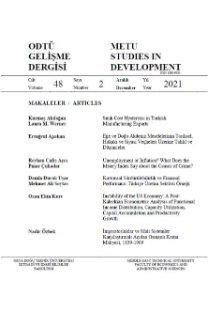Thomas Hobbes and International Relations: An Assessment
Thomas Hobbes ve Uluslararası İlişkiler: Bir Değerlendirme
___
- ARON, R. (1973), Peace and War, New York: Anchor Press.
- BEITZ, C. (1979), Political Theory and International Relations, Princeton: Princeton University Press.
- BERKI, R. N. (1981), On Political Realism, London: J. M. Dent and Sons.
- BROWN, K. C. (ed), (1965), Hobbes Studies, London: Basic Blackwell.
- BULL, H. (1981), ‘Hobbes and International Anarchy’, Social Research, 48 (4), 717-738.
- CARR, E. H. (1964), The Twenty Years’ Crisis, 1919-1939, New York: Harper Torch Books.
- FORDE, S. (1992), ‘Classical Realism’, in Terry Nardin and David R. Mapel (eds.), Traditions of International Ethics, Cambridge: Cambridge University Press.
- FORSYTH, M. (1979), ‘Thomas Hobbes and the External Relations of States’, British Journal of International Studies, 5 (3), 196-209.
- FORSYTH, M. (1988), ‘Thomas Hobbes: Leviathan’ M. Forsyth and M. Keens-Soper (eds), The Political Classics: A Guide to the Essential Texts from Plato to Rousseau, Oxford: Oxford University Press.
- GAUTHIER, D. P. (1969), The Logic of Leviathan: The Moral and Political Theory of T. Hobbes, Oxford: Clarendon Press
- HANSON, D. W. (1984), ‘Thomas Hobbes’s ‘High-way to Peace’’, International Organization, 38 (2), 329-354.
- HELLER, M. A. (1980), ‘The Use and Abuse of Hobbes: The State of Nature in International Relations’, Polity, 13 (1), 21-32.
- HOBBES, T. (1651/1983), Leviathan, London: J. M. Dent and Sons. ————(1640/1969), Elements of Law Natural and Politic, ed. by Ferdinand Tönnies, second edition, London: ————(1642/1836-45), De Cive: Philosophical Rudiments Concerning Government and Society, in The English Works of Thomas Hobbes of Malmesbury, ed. by Sir William Molesworth, 11 vols. London: J. Bohn. ————(1680/1969), Behemoth, or the Long Parliament, ed. by Ferdinand Tönnies, New York: Barnes and Noble.
- HOFFMAN, S. (1981), Duties Beyond Borders, Syracuse: Syracuse University Press.
- KANT, I. (1969), Eternal Peace, translated by C. J. Fredrich, in his Inevitable Peace, New York: Greenwood Press.
- KEGLEY, C. W. and WITTKOPF, E. R. (1995), World Politics: Trend and Transformation, fifth edition, New York: St. Martin’s Press.
- MACPHERSON, C. B. (1964), The Political Theory of Possessive Individualism: Hobbes to Locke, London: Oxford University Press. ————(1965), ‘Hobbes’s Bourgeois Man’, in K. C. Brown (ed), Hobbes Studies, London: Basic Blackwell.
- MORGENTHAU, H. J. (1960), Politics Among Nations, third edition, New York: Alfred A. Knopf.
- NAVARI, C. (1982), ‘Hobbes and the ‘Hobbesian Tradition’ in International Thought’, Millennium: Journal of International Studies, 11 (3), 203-222.
- PLATO (1964), Laws, trans. A.E.Taylor, in The Collected Dialogues of Plato, ed. by Edith Hamilton and Huntington Cairns, New York: Pantheon Books.
- ROUSSEAU, J. J. (1970) ‘Abstract of the Abbe de Saint-Pierre’s Project for Perpetual Peace’, and ‘Judgement on Saint-Pierre’s Project for Perpetual Peace’, in M.G. Forsyth, et all, (eds.), The Theory of International Relations: Selected Texts from Gentilli to Treitschke, London: G. Allen and Unwin.
- STRAUSS, Leo (1952), The Political Philosophy of Hobbes: Its Basis and Genesis Chicago: University of Chicago Press.
- STRAUSS, Leo (1965), ‘On the Spirit of Hobbes’s Political Philosophy’, in K. C. Brown (ed), Hobbes Studies, London: Basic Blackwell.
- THOMAS, K. (1965), ‘The Social Origins of Hobbes’s Political Thought’, in K. C. Brown (ed), Hobbes Studies, London: Basic Blackwell.
- THUCYDIDES, (1910), History of the Peloponnessian War, trans. R. Crawley, London: J. M. Dent and Sons.
- VINCENT, R. J. (1981), ‘The Hobbesian Tradition in Twentieth Century International Thought’, Millennium: Journal of International Studies, 10 (2), 91-101.
- WALTZ, K. N. (1979), Theory of International Politics, Reading: Addison-Wesley.
- WALZER, M. (1977), Just and Unjust Wars, New York, Basic Books
- WARRENDER, H. (1957), The Political Philosophy of Hobbes: His Theory of Obligation, Oxford: Clarendon Press.
- WIGHT, M. (1966), ‘Western Values in International Relations’, in H. Butterfield and M. Wight (eds), Diplomatic Investigations, London: G. Allen and Unwin.————(1991), International Theory: The Three Traditions, ed. by B. Porter and G. Wight, Leicester: Leicester University Press
- ISSN: 1010-9935
- Yayın Aralığı: 3
- Başlangıç: 2018
- Yayıncı: ODTÜ İİBF
Thomas Hobbes and International Relations: An Assessment
ABD Örneği'nde Üçüncü Yol: Yoksulluğa ve Eşitsizliğe Yaklaşımı ve Yeni Sağ ile Bir Karşılaştırma
Poverty and Turkish Labor Markets
Economic Theories of State or 'Economics Imperialism': Rent-Seeking Analysis as an Exemplar
Radikal Demokrasi: "Liberalizm mi, Demokrasi mi? Evet, Lütfen!"
